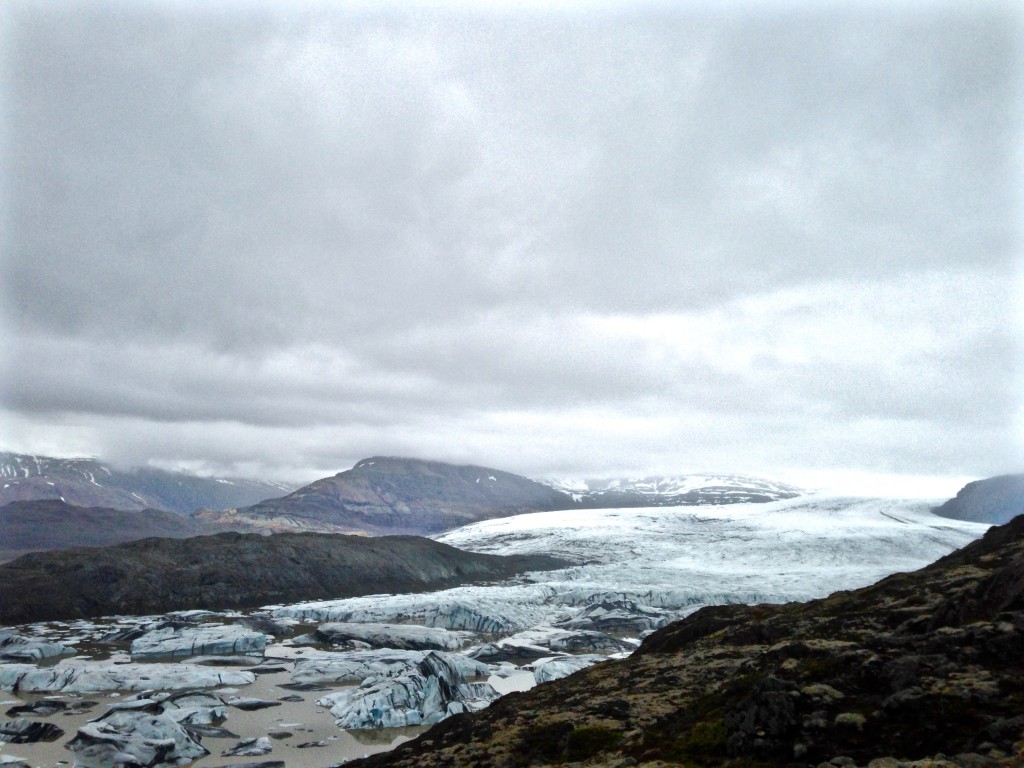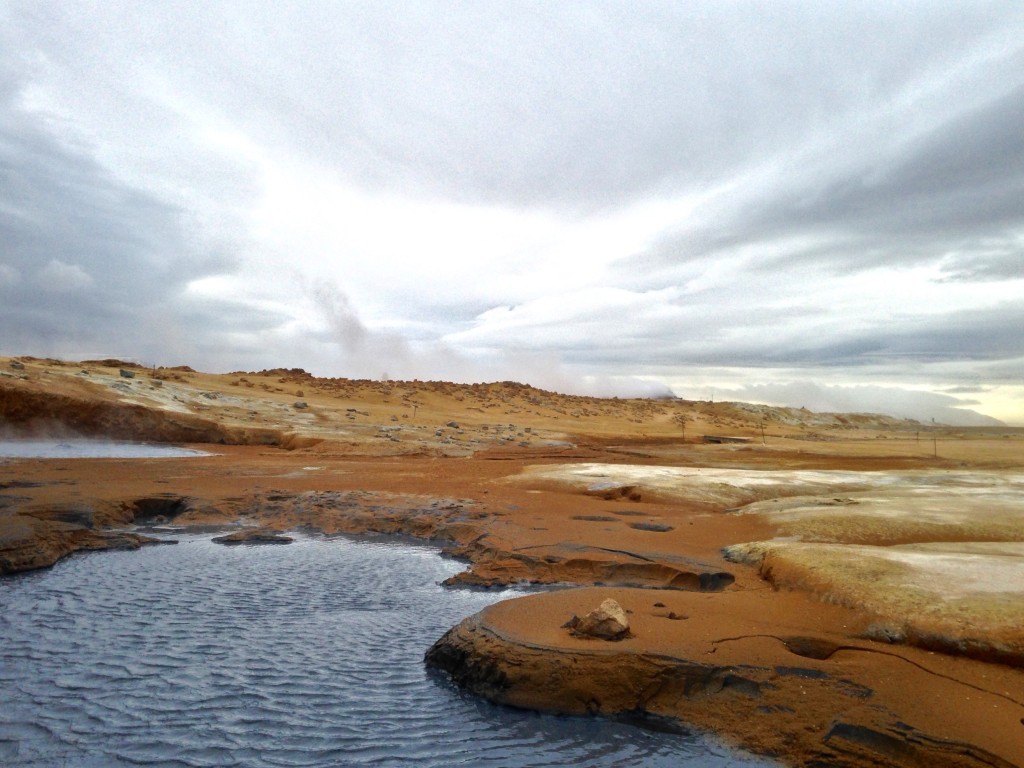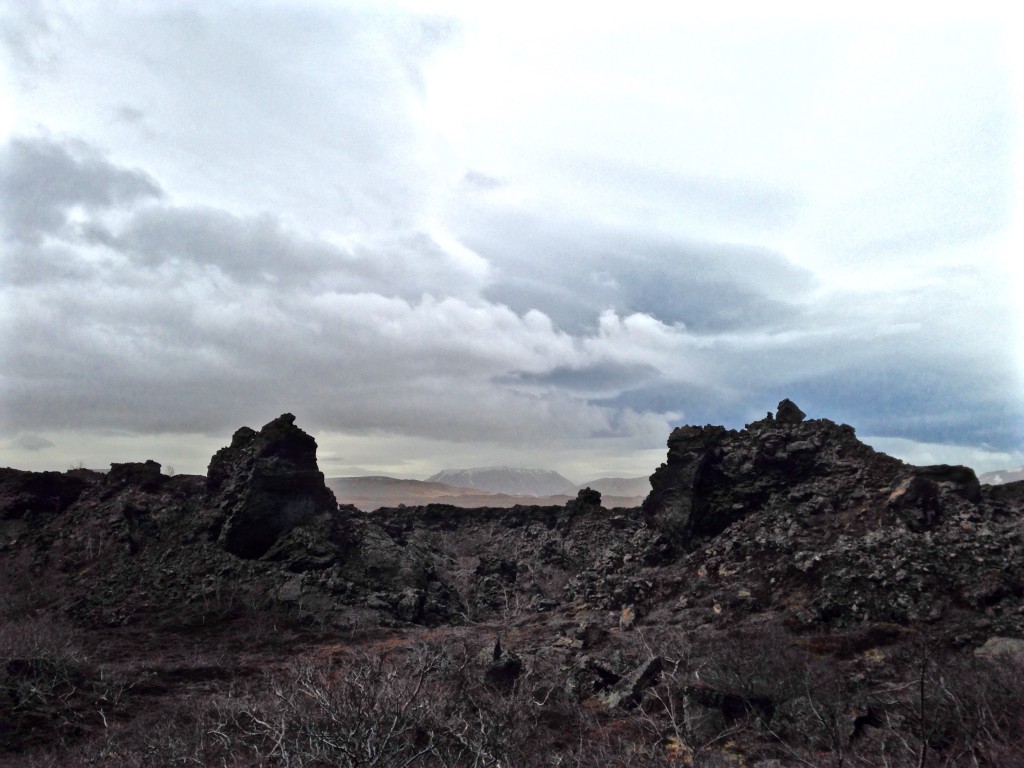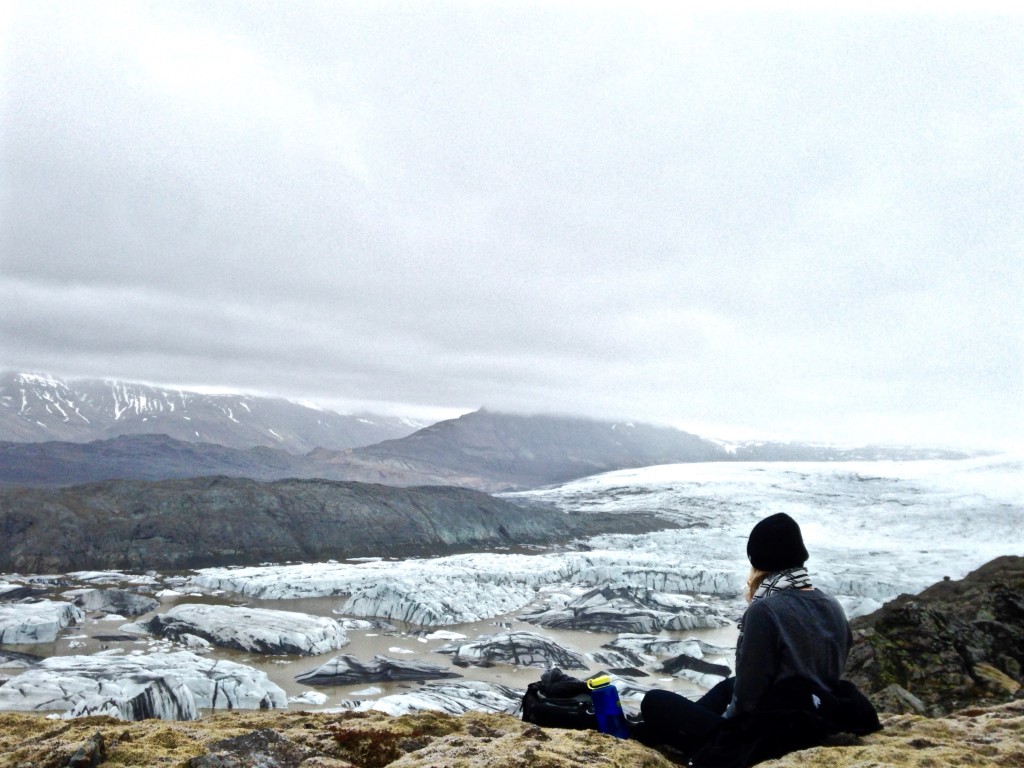Is there a word—maybe German—for seeing someone seeing you thinking about Nietzsche?
Forty-five minutes earlier, we had hiked into view of the Hoffellsjökull glacier, having abandoned our 4×4 at the end of the sometimes-flooded F-road (the Icelandic designation for unpaved, minimally maintained roads restricted to certain vehicle classes). It was the first time either of us had seen a glacier in person. Since then we had progressed as many feet in elevation as we had forward. Our legs burned. For lunch we lay on a patch of cliff carpeted in spongy sea-green moss, itself littered with lichen and strange flowers. Our brief settlement offered the most spectacular view yet of the valley carved and inhabited by the 2,500-year-old glacier.
Naturally, I ran through my common internal dialectic about whether ethics matter, whether we should all be nihilists, because, inter alia, we can’t even see past our own galaxy when we look up, “everything is an archive,” etc. As I was rounding Camus and heading toward Nietzsche, I caught a glance from Rhiannon, an odd mixture of concern and exasperation. Hence my question.
Feeling small in the face of cosmic scale is cliché. Yes. Granted.
Still: Among my earliest memories is a long series of sleepless nights I spent terrified of the Catholic idea of heaven: Eternity. World without end, Amen. Stuck. No exit. Terror in my six-year-old belly. Existing on an unending timeline has always been, for me, as unbearable as it is untenable.
The opposite is faith in some endpoint, in mutability. Consumption by the passage of time. So, I find certain places—West Texas, where on clear nights you can trace with your finger the eventual path of the Andromeda Galaxy into our own, or the Appalachian Mountains, where unassuming streams continue their quiet, steady work of carving canyons from billion-year-old limestone—to be soothing. If the rivers and mountains will be consumed, then I can’t presume an exemption for myself.
Again, yes, common anxieties. Agreed. I thought True Detective was pedantic, too.
I offer this background only to give you an idea of my frame of mind as we circumnavigated Iceland via the island nation’s breathtaking Route 1 (the “Ring Road”), hiked up mountains and around glacial tongues, held our noses and took cover from sulfuric earth-farts bubbling through boiling volcanic soil, and became—finally—fatigued at yet-another-glacial-waterfall. So often consumption is presented as the environmental villain and foil to preservation. But here I am affirmed: nature moves through consumption. What is matter other than that which is used, consumed?
I have never been witness to geologic destruction—consumption—so immense, diverse, unrelenting, and in-your-face as I was here.
I find myself, predictably, compelled to justify the whole enterprise of ethical judgment.
Let me go ahead and state expressly: preoccupation with cosmic mutability and human inconsequence is a weird headspace for vacationing with the person you love.
///
During all this I happened to find unintentionally packed in my luggage a paperback copy of Blue Nights, Joan Didion’s shattering dirge for her daughter and her impossible wish to have somehow in life preserved her daughter and husband (and herself) outside the passage of time. She dismisses a recurrent expectation that she take solace in all the “wonderful memories” she has: “Memories are by definition of times past, things gone . . . Memories are what you no longer want to remember.” Having lost her family, as well as several of her close friends, Didion has discovered the enormity of the chasm between a person’s presence and mere memory. Before someone is gone, we think we want to preserve the memory. But when someone is truly reduced to a memory, we no longer want to remember. We want the person. The comparison, for Didion, is nonsensical. Preservation is a rigged game.
Resist the urge to spiral those admonitions into abstraction. That isn’t metaphysics, it’s grief: for love lost, for life lost, for opportunities wasted with no justice or appeal. And it’s fear: of losing to the passage of time even memory’s consolation prize.
I find the profound sadness, powerlessness, and regret she describes horrifically scary. The feeling sticks with me through the various adventures we undertake during our last week here.
///
Earlier I mentioned that our hike up the steep cliffs overlooking Hoffellsjökull involved some fairly significant lactic burn. Though rarely as acute as it was on that day, the sensation of acid seeping into and breaking down our muscle fibers was frequent. The surrounding alien textures, sounds, and smells intermittently distracted us, yet the ache maintained. But dull acidic burn was not the only sensation. We felt at once pained and fortified. Energized by our strange and new surroundings, yes, but also intimately engaged with the sensation of muscular fatigue itself and a curious drive to maintain it. Thus, as those sensations grew familiar to us, so did our attendant decisions to ask our brick-heavy legs to absorb more acid as they carried us along mountainous paths.
Those hikes seemed a nice fit with my ruminations about consumption. I am using up my body. I am using my time by using up my body. Another comforting thought, in the moment: This is in my nature. Our nature? Consume, even ourselves. Drive toward an end.
At various times in the past I’ve found it easy to be alone with these lines of reasoning. To premise questions of ethics and nihilism with individualist, monadic premises. There’s a reason the sullen twenty-something walking alone through campus at night with his copy of Being and Nothingness is a stereotype.
Yet: As I watch the midnight sun dip toward—but not quite below—the 66th parallel and spew orange and violet light against cyan ice floes, I can’t consider any of this without also feeling tempered by my partner’s smile, without acknowledging that the legibility of my own human condition is inextricably linked to the ways in which we support and prioritize and collaborate with and fawn over and have stupid amounts of fun with one another.
Individualism is rendered incoherent, quaint.
I don’t believe in magic. I don’t believe our many gratifying, confused, and agonizing interdependencies place us on a pedestal amid the universe. But they do complicate our situation relative to that of, say, a river or a mountain, a planet or a star. This is why canon endorsements of nihilism are unsatisfactory. It isn’t because we’re afraid to face facts. It’s because nihilism belies our experiences—of love, of grief, of joy, of searing pain, of solidarity. This isn’t metaphysics, it’s empiricism. To regard our incalculable, compelling, ordinary social bonds as hollow isn’t nihilism at all. It’s narcissism. We will forgive only so much fallaciousness for high-collared tweed coats and cigarettes.
///
Where, exactly, this leaves me as we sit in Reykjavik on our final day in Iceland is difficult to articulate. Use up our bodies. Consume, even ourselves. Know also that death and loss and grief are certain and that, even knowing it, the pain of our loved ones’ consumption is unimaginable.
Didion again, on the inefficacy of mementos: “In theory these mementos serve to bring back the moment. In fact they serve only to make clear how inadequately I appreciated the moment when it was here. How inadequately I appreciated the moment when it was here was something else I could never afford to see.”
Thus the paradox in which Didion, and we, are stuck. The moment can never be appreciated adequately. To appreciate a moment is backward-looking. From the outset the problem has been framed as one of preservation. That game is rigged.
How inadequately we appreciate moments when they are here is something we cannot afford not to see.
We are creatures of consumption, not preservation. We are part of nature, after all.
We are also creatures of partnership and love, of friendship and bonds.
If the best we can do is to burn out together, I don’t think that’s half bad.
But please note: Tomorrow I will spend six hours in an aluminum tube, pressed on one side against a stranger’s upper arm and on the other against one or another of my partner’s boney, drooly, or boney and drooly bits. Should I return to Austin free of bird flu, I reserve the right to rethink some of this togetherness business.








